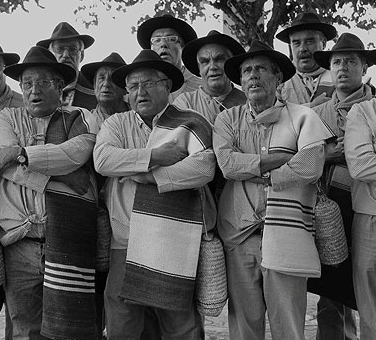LES 20 ANS D'ANIMATOU: prélude estival et anticipations de l'édition 2025
1.07.2025


Double concert avec entracte | Double concert with intermission
Moços D’uma Cana est une jeune formation de violas campaniças de Castro Verde, fondée et dirigée par le professeur José Abreu, musicien et artisan, qui enseigne aux étudiants à fabriquer leur instrument et à en maîtriser les techniques de jeu. Moços D’uma Cana apporte une nouvelle jeunesse au répertoire, tout en restant fidèle à l’essence de cet instrument, sa tradition et sa mémoire.
Pendant la première moitié du XXème siècle, la viola campaniça, instrument à cordes joué avec le pouce, était la reine des bals du sud de l’Alentejo. On retrouve celle-ci aussi dans les tavernes, accompagnant les chants, comme le «Cante ao Despique» (les joutes de chants), et d’autres types de chants, improvisés et entonnés pendant des heures. Des chanteurs et des musiciens comme Manuel Bento, Perpétua Maria et Francisco António ont sauvé de l’oubli cet instrument par l’authenticité de leur interprétation. La viola demeure aujourd’hui l’ambassadrice culturelle de cette région.
Moços D’uma Cana is a group of young musicians from Castro Verde, who play violas campaniças founded and directed by professor José Abreu, a musician and artisan, who teaches students to build their own instrument and play them, perfecting their techniques. Moços D’uma Cana brings fresh youthfulness to the repertoire, while remaining faithful to the essence of the instrument and its tradition and history.
During the first half of the 20th century, the viola campaniça, a stringed instrument played with the thumb, was the queen of the ball in the southern Alentejo region. The instrument was also a staple in taverns, accompanying songs like the “Cante ao Despique” (the jousting of songs), and other types of ballads, improvised and belted out for hours. Singers and musicians such as Manuel Bento, Perpétua Maria and Francisco António saved the instrument from oblivion by the authenticity of their performances.
Today, the viola remains the cultural ambassador of the region.
Contact: Prof. José Abreu | +351 965 792 786 |
créés en 1972, visent à préserver et diffuser le «Cante Alentejano» dans le respect des coutumes et des traditions de cette région.
Dans le patrimoine culturel du Portugal s’inscrit une expression musicale qui se caractérise par son authenticité et sa singularité: le «Cante Alentejano», ou chant polyphonique de l’Alentejo, aujourd’hui reconnu comme patrimoine culturel immatériel de l’humanité par l’Unesco.
Ce chant polyphonique, a cappella se structure ainsi – voix principale («Ponto»), alto, et voix secondaires («Segundas Vozes») – et selon un répertoire de chansons («Modas») sur des thèmes comme l’amour, le travail, la contemplation et la nostalgie.
created in 1972, seek to preserve and spread the “Cante Alentejano” in respect of the customs and traditions of the region.
Inscribed in Portugal’s cultural heritage is a musical expression
noted for its authenticity and originality: the “Cante Alentejano”, or polyphonic song of the Alentejo, recognized today on UNESCO’s list of the intangible cultural heritage of humanity. This polyphonic song has no musical accompaniment and consists in a main voice (“Ponto”), alto, and secondary voices (“Segundas Vozes”), with a repertoire of songs (“Modas”) on themes like love, work, contemplation and nostalgia.
Contact : Associação de Cante Alentejano Os Ganhões Castro Verde | Portugal | +351 286 320 040 |
Un programme culturel proposé par | A cultural programme proposed by
José António Cunha